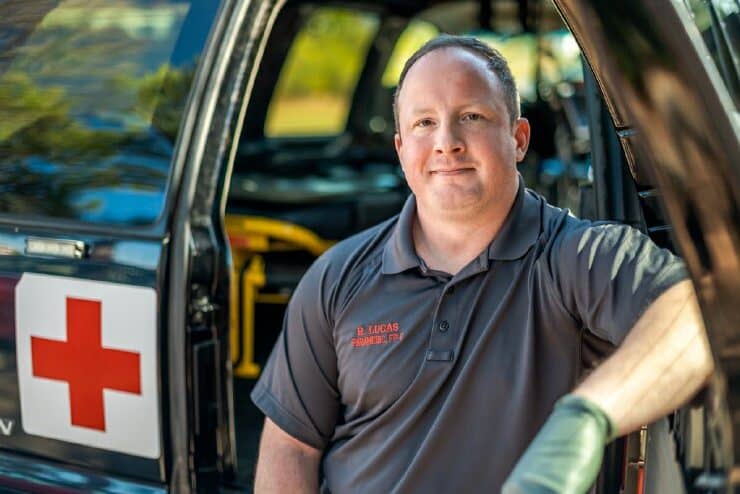
As U.S. Army critical care flight paramedic Ryan Lucas sits in his emergency vehicle on a drop zone in Fort Liberty, he is ready to address any number of emergencies that can arise as paratroopers fly through the sky. But as opportunities allow on site, he is also able to crack open his laptop and study how to become an even more effective paramedic.
As U.S. Army critical care flight paramedic Ryan Lucas sits in his emergency vehicle on a drop zone in Fort Liberty, he is ready to address any number of emergencies that can arise as paratroopers fly through the sky. But as opportunities allow on site, he is also able to crack open his laptop and study how to become an even more effective paramedic.
“I’m able to study anywhere,” Lucas said. “Even when there’s no internet connection, if I download course slides ahead of time, I can study anytime I have some extra time on my hands.”
Lucas is one example of paramedics across the nation taking part in Methodist University’s new and unique online bachelor’s degree program in Advanced Paramedicine.
“To my understanding, this is the only degree program of its kind in the country,” said Dr. Ginny Kaplan, chair and assistant professor of Health Care Administration at MU, who has been involved in emergency medical services for 24 years as both a credentialed paramedic and paramedic instructor.
Typically, the road to becoming a paramedic starts with completing continuing education (non-credit), an associate degree, or a bachelor’s degree in paramedicine. Since many paramedics take the continuing education or associate degree route, they are left with taking “bridge” programs (which often require an associate degree or prior college classes) if they are interested in obtaining a bachelor’s degree – forcing paramedics to retake many of the initial paramedic concepts they have already learned.
“To my understanding, this is the only degree program of its kind in the country,”
However, Methodist University’s Advanced Paramedicine program allows paramedics to use their time and money more wisely by expanding on their education.
“This program is designed to start where their school left off and move forward medically,” Kaplan said. “For example, paramedics are taught about the physical aspects of aging, but not about the psychosocial aspects of aging and how that changes how a person might look at the world. We’ll dive deeper into both here at MU.”
MU’s Advanced Paramedicine program is geared towards current paramedics. While the program does not require an associate degree, it does require proof of an active paramedic credential or military designation in a paramedic role – allowing students to qualify for a minimum of 36 (maximum of 93) hours of transfer credit and complete their bachelor’s degree in just two years.
The new program welcomed its first group of 12 students in January, already featuring students from all over the map (New York, California, Georgia, and of course, North Carolina, as examples). The demand for this type of program is so high that at least 13 additional students (and counting) have registered for the following semester.
“Methodist University doesn’t make me feel like an online student, they make me feel like a Monarch.”
“Critical care paramedicine is an exploding field,” Kaplan added. “It’s primarily due to the primary care shortage. Paramedics are getting into a lot of different areas in healthcare that we really haven’t had before. The more educated you can be, the more prepared you’ll be for all of those areas.”
The program provides paramedics with an opportunity to pursue graduate medical education, like MU’s Physician Assistant Studies program and the planned Methodist University Cape Fear Valley Health School of Medicine. It also allows paramedics to enter a new phase of their life. Lucas, a husband and father of three children, plans on retiring from the U.S. Army when he graduates from MU’s Advanced Paramedicine program at the end of 2025. After graduation, he plans on volunteering with rural organizations to provide routine medical care to the elderly.
“This Advanced Paramedicine program will teach me how to best utilize my skills to help my community and have an impact,” Lucas said.
Only a few months into the Advanced Paramedicine program, Lucas raves of the program’s online platform and the flexibility it allows him with his busy work and life schedule. In fact, he is so passionate about the program that he has already tried recruiting fellow paramedics to the program.
“I wish I could have done this earlier, but this is the first time there’s been a program like this,” he said. “I’m encouraging everyone in my flight paramedic community to jump on board. Even if you think you’re at the top of your game, you’re going to learn a lot in this program.”
Lucas looks forward to making his family proud with an accomplishment that is made possible by Methodist University’s revolutionary Advanced Paramedicine program.
“I’m grateful for everything that Methodist University has provided to me through this program. The Methodist University staff has been there every step of the way for me… and the professors are so responsive, even when it’s 10 or 11 at night,” Lucas said. “Methodist University doesn’t make me feel like an online student, they make me feel like a Monarch.”